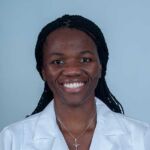In 2021, Akwi Asombang, MD, MPH, joined the MGH Division of Gastroenterology, a branch of medicine focused on diseases of the digestive system, as a member of the Interventional Endoscopy team and Director of Global Health Programs. As an interventional gastroenterologist, Dr. Asombang performs advanced nonsurgical procedures that are vital to the identification and treatment of digestive disorders. Recognizing the gastroenterology resources and training are not available everywhere, Dr. Asombang currently works to build this capacity on the African continent.
We talked with Dr. Asombang to discuss her motivations for doing global health work, current projects, and vision for the division’s global programs.
The following interview has been edited for length and clarity.
What led you to wanting to improve gastroenterology capacity globally?

Akwi Asombang, MD, MPH
The global health component of my career was shaped by my life and upbringing. Everything I do now goes back to the foundation my parents created and what I saw as areas of need. For example, I identify as Zambian Cameroonian. I was born in Cameroon, grew up in Zambia, and lived in Ethiopia. I also went to school in Kenya, a military academy in the United States, and medical school in India. My father worked for the United Nations. Through his work and my life, I have seen quite a bit of Africa and the world. I had an opportunity to see what I have and what I can give to those who may not have.
How would you describe the global state of gastroenterology? What are some gaps you have noticed between the US and other countries you have worked in?
The biggest gaps are related to training and the availability of resources.
For example, in Zambia, with a population of approximately 18 million, we have less than 20 gastroenterologists—none of which can perform advanced endoscopic procedures. In Nigeria, for a population of 200 million people, you may have a handful of endoscopists who consistently perform endoscopic retrograde cholangiopancreatography (ERCP), an advanced endoscopic procedure that treats biliary diseases.
In contrast, Massachusetts alone has several hundred gastroenterologists and 50 to 100 interventional endoscopists for a population of 6.7 million people. These manpower gaps are a big deal because they impact patient care, diagnosis, and treatment, particularly an issue for gastrointestinal cancers.
Another gap is the availability of resources—specifically medical devices and endoscopic equipment. We need more investment from medical device companies to improve the availability and maintenance of equipment which will allow for increased training in Africa.
What are some ways you have tried to reverse these gaps?
I believe in collaborations, partnerships, skill transfer, sustainability, and accountability. For example, five years ago, I partnered with Dr. Olusegun Alatise from the Obafemi Awolowo University Teaching Hospital in Nigeria to establish an ERCP endoscopy training program. Prior to this, patients needed to leave the country to get this care. Now, ERCP capacity exists within Nigeria which was especially important during the peak of the COVID-19 pandemic when patients could not travel.
Mentorship is also extremely important to me. I founded the African Association of Future Gastroenterologists (AAFG) and co-founded the Pan African Organization for Health Education and Research (POHER) with the intention of mentoring medical students and early career doctors.
I also try to reach patients and form partnerships across the African continent through a monthly virtual patient education series with POHER. This year I started highlighting colorectal cancer in different parts of the continent, such as in Nigeria and Ghana.
What are some specific projects you are currently working on and what is your hope for the gastroenterology division’s global work?
My colleagues in Nigeria and I developed a gastroenterology program that focuses on skill transfer, capacity building, and long-term collaboration between the gastroenterology division at Mass General and the World Gastroenterology Organization (WGO) Lagos Training Center. This program will facilitate the development of skills in both general and advanced gastroenterology techniques to promote quality medical training and healthcare delivery.
Additionally, we hosted one of the largest colorectal cancer awareness events for Africa in March, in partnership with the WGO, Society for Gastroenterologists and Hepatologists in Nigeria, POHER, AAFG, and other organizations. I hope this webinar has built a network for colorectal cancer clinicians in Africa so we can collaborate on research and data sharing.
I am also continuing my work with Dr. Olusegun Alatise in Nigeria—our next step is to start training a new class of endoscopy nurses and doctors this year. Our goal is to train more endoscopists in both ERCP and, eventually, endoscopic ultrasound. I am also partnering with colleagues in Zambia to establish endoscopy training.
What have you learned throughout your career of global health work?
I think the most important part of global health work is that sometimes it is not about you. It is about the people you are working for: the patients and your partners. You cannot go into any place thinking, “I am coming from America, and I know it all.” Most of the work I did started at home in Zambia, in Southern Africa. I already knew the people; I had worked in that system. Yet I still always ask, “What are your needs?”
Dr. Asombang recently became the first recipient of the Center for Global Health’s Medical Education and Innovation Development Award. We look forward to our continued partnership with her and the gastroenterology division’s global work.

